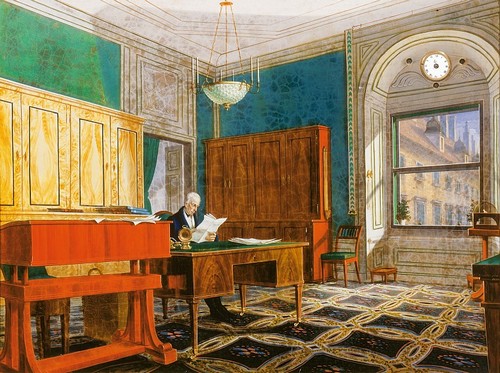
But we're interested in Haydn's Lied. As I said when we talked about Brahms' lullaby, it is worth listening carefully, as if it was for the first time. Pay attention to the simple accompaniment, with the right hand doubling the voice with chords; in fact, both share the stave. This was very usual at the time, when it was understood that the piano accompaniment was only that, accompaniment, to help the voice. The Lied is strophic, that is, the four stanzas of the poem have exactly the same music. The version we're listening today with Elly Ameling and Jörg Demus, however, includes only two of them: the first and the last ones. There is a recording of Dietrich Fischer-Dieskau even shorter, only the first verse. It's not usual to abridge the poems; it's only possible with strophic songs, of course, and when it's done it's because the poem lacks of interest. In this case, as you can imagine, the poem only praises the emperor and wishes him a very long life.
Haydn liked very much his Kaiserlied. During his last months of life, when he was too ill to compose, he used to play it on the piano. Shortly after composing it, in 1797, he included it in his string quartet no. 62 Hob.III:77, hence known as "Emperor"; the second movement are variations on the theme of the Lied. In 1799, Haydn went back to the Kaiserlied, this time he made a piano transcription of the variations. The Lied is rarely performed in concert but both, the quartet and the piano variations, are usual in a repertoire.
Here you are Gott erhalte Franz, den Kaiser, listen to it and let me know what you think. Within a month we'll listen to the most famous work of another composer and meanwhile, every week, we'll have a new story.
Gott erhalte Franz, den Kaiser,
Unsern guten Kaiser Franz!
Lange lebe Franz, der Kaiser,
In des Glückes hellstem Glanz!
Ihm erblühen Lorbeerreiser,
Wo er geht, zum Ehrenkranz!
Gott erhalte Franz, den Kaiser,
Unsern guten Kaiser Franz!
Froh erleb' er seiner Lande,
Seiner Völker höchsten Flor!
Seh' sie, Eins durch Bruderbande,
Ragen allen andern vor!
Und vernehm' noch an dem Rande
Später Gruft der Enkel Chor.
Gott erhalte Franz, den Kaiser,
Unsern guten Kaiser Franz!
God keep Francis the emperor,
Our good Emperor Francis!
Long live Francis the emperor,
In the brightest splendour of happiness!
May sprigs of laurel bloom for him
As a garland of honour, wherever he goes.
God keep Francis the emperor,
Our good Emperor Francis!
May he gladly experience the highest bloom
Of his land and of his peoples!
May he see them, united by the bonds of brothers,
Loom over all others!
And may he hear at the edge
Of his late tomb his grandchildren's chorus.
God keep Francis the emperor,
Our good Emperor Francis!
(translation by Wikipedia)













Comments powered by CComment